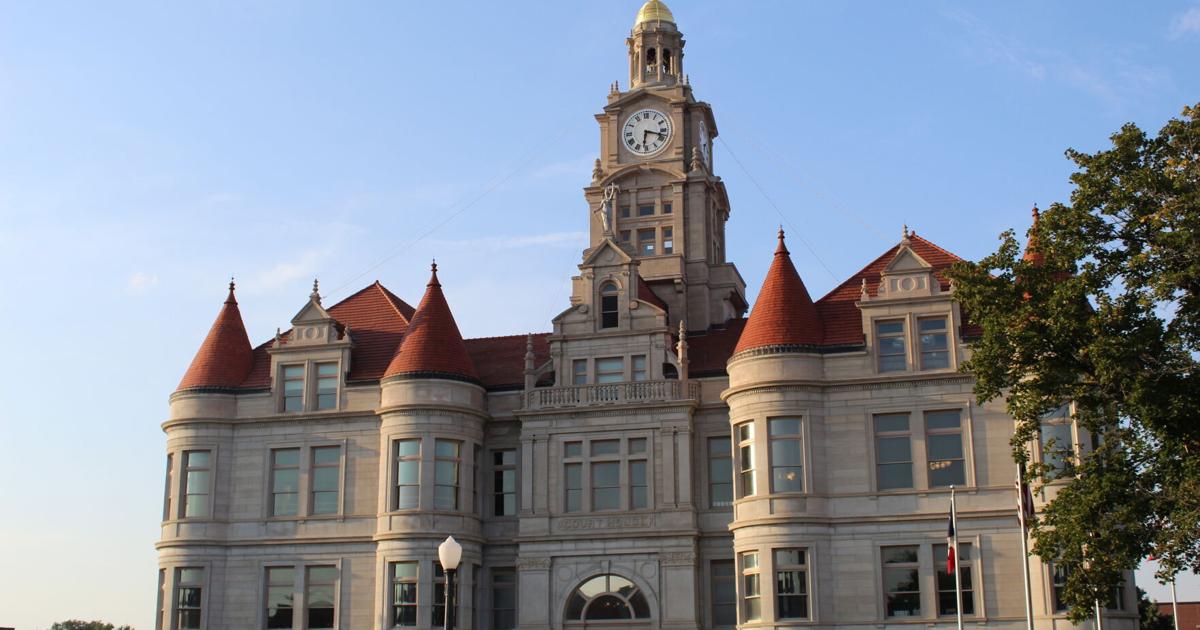
Madonna Johnson remembers driving through mostly farmland from West Des Moines to Waukee to drop her daughter off at dance class. That was 20 years ago.
Today, the former two-lane Hickman Road is four lanes and surrounded by housing developments, strip malls and big box stores.
“It’s very, very different,” Johnson said. “That’s a short time period for this amount of development to go up.”
Johnson, who grew up in nearby Warren County, moved to West Des Moines in Dallas County to raise her family a few decades ago. She currently chairs the Dallas County Republicans and lives in Waukee, where she says new housing developments and businesses continue to spring up on land once home to sprawling cornfields.
“Dallas County used to be really rural farming, so it’s always been a red county, but now we have builders slapping up houses and people moving here and moving into Iowa, not just from Polk County,” Johnson said. “That’s really where the rubber hits the road.”
Over the last decade, Dallas County, on the western edge of the Des Moines metro area, has seen the largest population growth of all of Iowa’s 99 counties and is one of the fastest-growing counties in the country.
Since 2010, the county has seen a nearly 73% population increase, going from 66,751 residents in 2010 to 115,343 residents in 2024. Iowa’s total population growth was about 5% in the same time period. The county went from being ranked the seventh fastest growing county in the country in 2010 to the fourth fastest growing following the 2020 census.
Once a primarily rural area, Dallas County has both small towns, including Adel, Perry and Dallas Center, and suburbs where the county line slices through Urbandale, West Des Moines and Clive.
And with the significant population shift in Dallas County also came a political one.
As Iowa has trended rightward over the last 12 years, Dallas County has stood out as one of the only counties in the state to move toward Democrats, shifting 6.8 percentage points to the left across the last four presidential elections.
Former Republican Sen. Mitt Romney won the county by 11.55 percentage points in 2012. President Donald Trump took the county in the last three elections by 9.43 percentage points in 2016, 1.97 percentage points in 2020 and 4.69 percentage points in 2024, his margins have remained steady compared to other counties in the state where he has significantly increased them year after year.
Similarly, the county has also swung leftward in gubernatorial races.
In 2014, the county went to former Republican Gov. Terry Branstad by 33.3 percentage points and in 2022, it went to Gov. Kim Reynolds by 8.1 percentage points.
But Dave Roszak, a county resident and member of the Dallas County Republicans central committee, said the shift is primarily driven by population and not by residents going from voting for Republican to Democrats.
“You won’t see a lot of Republicans in Dallas County switching to Democrats. That’s not why we’re doing that now. It’s because of people moving into the area,” Roszak said. “That’s a lot of apartments, people coming in from the colleges, going into their apartments, starting their jobs.”
Industry in the county has boomed alongside the population. It’s home to a Wells Fargo campus, Sammons Financial and ITC Midwest. Last year, Apple opened a data center in Waukee and Microsoft has one slated to go up in Van Meter.
The county has the highest medium household income in the state, sitting at $102,349 compared to Iowa’s $71,433 average.
And as the state ages, Dallas County’s average age of 35.9 is below the state’s average of 39.1.
Aside from industry, Johnson says another main draw to the area for young families are the area’s public school systems.
“It’s been a natural migration of people from Polk County, mostly looking for good schools,” Johnson said.
‘There’s more people to meet’
Roszak has lived in Dallas County for over 25 years, where he and his wife raised their now five adult children. He worked in finance and is running for Dallas County Supervisor.
He is no stranger to knocking on doors in the county and said there are always more to go to as new houses pop up and residents arrive across campaign cycles. He said being able to appeal to voters on both sides of the political aisle is key to winning elections in the county where party registration continues to shift leftward.
“You’re probably going to need Democrats, so you’ve got to talk about issues that affect 90% of the people, and right now … Dallas County is growing,” Roszak said.
While Republicans still lead voter registration totals in the county, the gap between the two political parties’ numbers has remained consistent as Republican voter registration totals have quickly outpaced those of other parties across the state.
Between 2012 and 2024, the number of registered Democrats increased by 71%. Registered Republicans grew, but at a slower rate, showing a roughly 44% increase. No-party voters grew 26% during that time. Still, more Republicans are registered, 23,502, than Democrats, 17,797, or no-party voters, 21,084.
Tom Walton, former chair of the Dallas County Democrats, is introducing himself as a moderate Democrat to voters as he runs for Iowa House District 28, which encompasses Adel, Van Meter and the southern part of West Des Moines.
“Are they predominantly Republicans or Democrats?” Walton said. “Of course, the biggest segment is non-party.”
Like Roszak, Democratic Iowa state Sen. Sarah Trone Garriott also believes door-knocking in the district is essential to winning elections in the county.
“A lot of those neighborhoods didn’t even exist five, 10 years ago,” Trone Garriott said. “Waukee has eight to 10 new residents every day. As I’m knocking, I’m aware that they’re building new houses and people are moving in right behind me. There’s more people to meet.
“The county is kind of a microcosm of the whole state. So we have a growing suburban kind of metro area. We have small towns, we have rural communities, and so it’s a little bit of everything,” she continued.
Trone Garriott was first elected to the Iowa Senate in 2020 when she flipped a Republican held seat in an Iowa Senate District 22. In 2022, the district’s lines were changed and Trone Garriott decided to move west to Dallas County to run against then Republican Iowa Senate President Jake Chapman for the Iowa Senate District 14 seat.
Trone Garriott unseated Chapman by 2.9 percentage points the same year that Reynolds won the district by about 7 percentage points. And last year, she won reelection by just 29 votes.
She attributes her wins in the area to what she says is residents’ willingness to base their votes on individual candidates rather than political party.
“When I show up on the doors and I’m knocking Republican and independent voters, primarily, people tell me all the time that they vote for the person, and not the party,” Trone Garriott said. “If they don’t get to meet the person, and they don’t know who’s running, then they default to the party. And so meeting folks, showing up, makes the difference, and it helps break down some of the division that we see in this country. It helps connect people. And truly, a lot of our voters here are not that partisan. They’re ticket splitters.”
Suburbs and small towns
Micki Henderson moved back to her home state of Iowa in 2017 to be closer to family after living in Colorado and Virginia. Before her initial move away, Henderson lived in Polk County but noticed the increased suburban sprawl.
“Waukee used to be a very small town that everyone drove past to get to Des Moines, and now it merges with everything else,” Henderson said.
A stay-at-home mom of three kids, Henderson has become more engaged in local politics and community groups, including the Southeast Dallas County Democrats. Henderson says meetings have grown over the last few years from five people around a table to rooms full of at least 40 attendees.
Henderson dedicates a lot of time to door knocking for Democrats and said political conversations in the community have grown more tense over the last few elections.
“You have to be very careful of things when you’re talking to your neighbors, when you’re talking to your kids’ friends’ parents,” Henderson said.
She added that mutual connections over local schools, high school sports and other community projects remain a keystone for civil discourse in the county.
“But usually you can find a common ground, whether it be the public schools that our kids are going to or wanting … the community safer, you usually find some sort of touch points,” Henderson said. “Most of the contention is national. But when you’re talking to your neighbor about what everyone wants locally, it’s usually pretty universal.”
Johnson says while other areas of the country and state have grown more politically divisive, the fast-growing Dallas County has been able to remain tight knit, between its towns of 1,000 residents and the booming Des Moines suburbs.
“I wouldn’t call it divisive,” Johnson said. “We respect one another’s opinions, and we go back to raising our kids … back to our job, and we get a vote again in two years through the midterm and four years whatever happens, right? That’s democracy. We’re not going to throw mud.”
Love
0
Funny
0
Wow
0
Sad
0
Angry
0
Get Government & Politics updates in your inbox!
Stay up-to-date on the latest in local and national government and political topics with our newsletter.
* I understand and agree that registration on or use of this site constitutes agreement to its user agreement and privacy policy.
Maya Marchel Hoff
Statehouse Reporter
Get email notifications on {{subject}} daily!
Your notification has been saved.
There was a problem saving your notification.
{{description}}
Email notifications are only sent once a day, and only if there are new matching items.
Followed notifications
Please log in to use this feature
Log In
Don’t have an account? Sign Up Today



